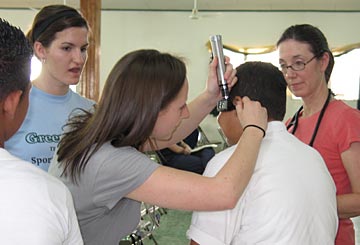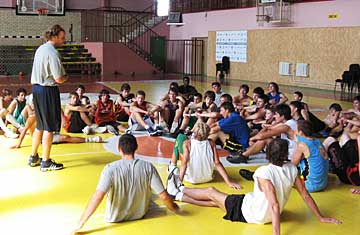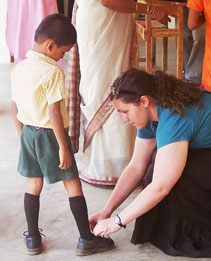Posted: 8/24/07
|
| Kelsey Simons, a Baylor University nursing student, helps provide a basic medical exam during a mission trip to Mexico. (Photos courtesy of Baylor University) |
Discipline-specific missions help
Baylor students apply learning to life
By Ashley Lintelman
Baylor University
About 125 Baylor University students joined faculty and staff in missions projects to meet needs in Armenia, Honduras, Kenya and Mexico.
Coordinated by University Missions, Baylor’s Louise Herrington School of Nursing and Baptist Student Ministries, each trip offered students hands-on learning and mission opportunities.
 |
| A Kenyan student draws a picture of his “Teacher Tiffani.” |
“While encouraging students to participate in church-based mission trips, Baylor also is offering discipline-specific missions as an expression of our identity as a Christian university,” said Rebecca Kennedy, director for University Missions at Baylor. “We want to create opportunities for students to understand and utilize their God-given gifts and abilities in serving others and spreading the love of Christ.”
Baylor’s inaugural trip to Armenia focused on laying the groundwork for future missions work that will focus on economic development, as well as evangelism and discipleship.
Walter Bradley led a team of engineering majors who joined students from two other universities to build two low-cost and energy-efficient model homes for low-income families. With the assistance and contacts of local Armenian-American builders, the team met its goals and already has requests for 15 additional homes.
A second Baylor team concentrated on business and leadership development. Marlene Reed, visiting professor in management, taught a leadership development course to Armenian business leaders and has agreed to work with University Missions next year to provide additional leadership for Baylor’s Outdoor Recreation/Tourism team project. Students from that team will work to build partnerships with local business leaders to create a sustainable tourism and outdoor recreation business.
Next summer, Baylor students and team leader Kelli McMahan, assistant director of campus recreation and program director for Outdoor Adventure Living-Learning Center at Baylor, will begin a long-term task of mapping trails for hiking and biking in Armenia.
Maxey Parrish, lecturer in journalism at Baylor, led a general ministry team to Armenia to provide social ministry and evangelism to unchurched villagers throughout the country. The team assisted a missionary and a local church through children’s Bible clubs, community carnivals and manual labor, and its members were part of the first evangelical Christian service to be conducted in the 1,500-year-old village.
“My favorite part of every mission trip I take is seeing my students exposed to situations in which the only way to succeed is to rely on God and see him at work,” Parrish said. “Putting (the trip) in God’s hands and leaving the results to him, you can’t help but experience him in a different way.”
Baylor students have served in Honduras since 2002, beginning with deaf education through the department of communication sciences and disorders. This year, five additional teams from engineering, education, nursing, medical and general ministry participated in the trip.
“Faculty and staff-led teams from various disciplines at Baylor create ways for students to explore what it looks like to serve God by using the skills and expertise from their major and field,” Kennedy said.
“Participating in discipline-specific teams often allows students to have even more to offer as they serve in international settings. Students also greatly benefit from learning and serving alongside professionals in their respective fields, and this experience can help shape a student’s view of their own future of service and ministry.”
Baylor students on the deaf education team worked with students in the only deaf school in Honduras, while team leader Lori Wrzesinski, director of Baylor’s American Sign Language program, focused on teaching English as a Second Language to Honduras’ deaf school teachers. This year Wrzesinski had her first graduating ESL class, Kennedy said.
Another team led by Nancy Pfanner, lecturer in communication sciences and disorders, helped a nonprofit organization in host an annual camp for deaf and hearing-impaired children.
 |
| Audrey Koenig (foreground) and Lori Spies (right) provide an ear exam to a patient in Honduras during a Baylor-sponsored mission trip. |
The medical and nursing teams provided relief and assistance to local medical clinics. Baylor students gave immunizations to local villagers each day and used medical supplies to meet the needs of impoverished communities.
Nursing students provided health checkups to every child attending the host church’s school in Chuloteca. Students put together seminars on health, hygiene, nutrition and sexually transmitted infections at both public and private schools. A Baylor graduate student led an extensive question-and-answer session specifically for women both at the church and throughout the community.
Other teams included an education and general ministry team led by Baylor education professors Randy Wood and Rick Strot and Baylor BSM director Clif Mouser. Team members taught Bible stories and provided manual labor, health care and ESL training for teachers at a recently established Christian school at a church in a small Honduran village.
Seven Baylor students served with GoNowMissions, a Baptist Student Ministries program that offers students the opportunity to raise money and serve others for either a semester or for a summer. In addition to sponsoring a team to Honduras, the BSM also partnered with Habitat for Humanity to construct houses and provide practical relief to the people of New Orleans.
Meanwhile, a Baylor engineering team led by Brian Thomas, lecturer in engineering at Baylor’s School of Engineering and Computer Science, built a micro-hydro-generator and installed a water purification system in Honduras.
For the third year in a row, 93 Baylor faculty, staff and students traveled to Kenya, the largest number of participants to date.
Led by Randall Bradley, director of Baylor’s Center for Christian Music Studies, and Sharyn Dowd, associate professor of religion, Baylor students used music to reach orphans and neighboring villages, while representatives from University Baptist Church in Waco built partnerships with Kenyan churches to provide social ministry within village communities.
Students from Baylor’s Truett Theological Seminary trained future Kenyan leaders in HIV/AIDS education, evangelism, church leadership and community development, as well as business sustainability. The teams worked with several faith-based organizations in order to accomplish their goals.
Several freshmen and sophomore students provided general ministry to Kenya’s HIV/AIDS victims, orphans and widows. Despite the language barrier, students played games and learned songs with Kenyan children during their lunchtime.
Tiffani Riggers, a graduate assistant for University Missions and a team leader with fellow grad student Marquette Bugg, said Kenyan parents often are too tired to play with and show affection to their children due to long daily struggles to get money to feed their families. Giving individual attention to the children allowed team members to show God’s love by filling that parent-to-child void, she noted.
“Knowing that spiritually we made an impact is awesome, and we had a great reminder that we don’t always see the fruit of our works until we are in heaven,” Riggers said.
Also in Kenya, engineering students, faculty and staff continued to provide practical solutions for real-world needs, such as the installation of solar panels in a deaf school with no electricity, the construction of windmills to provide electricity for a school and the designing of a foot bridge to be built over a river in eastern Kenya.
In 2006, Baylor students created a non-profit organization called Omega Kids, which provides resources to Kenyan pastors who minister to orphaned street children. This year, Omega Kids donated money and helped a local pastor purchase land for a dormitory to be built specifically for street children.
Riggers reflected that the time in Kenya showed how much Americans take for granted, “from the amount and type of food that we choose to eat, to the clothes we wear.” Riggers described the desperate need, the incredible joy and indelible hope that the Kenyan people had, even while living in abject poverty.
“It was a very special time for me, as I felt that our Baylor students were seeing how much they are a part of something bigger than just a mission trip,” Riggers said. “It was wonderful to get to worship God in a Kenyan church with my brothers and sisters and know that even though we may have been speaking different languages, we were worshipping the same God.”
Baylor’s nursing school continued a 30-year tradition of students providing care in Juarez, Mexico. While in Juarez, students set up free clinics inside a local church and offered complete health check-ups to assess the general needs of children and adults. Medication, prayer and health education were often provided. Clinics also are a way for the local church to make life-long contacts with people in their community, helping them to continue to reach those in need.
Another trip was planned in Mexico City, where faculty, staff and students were slated to continue to administer health check-ups to the housing community in Mexico City.
“It is a practical exercise in servant leadership, improving health care and gaining skills and expertise as nurses,” Spies said.
News of religion, faith, missions, Bible study and Christian ministry among Baptist churches, in Texas, the BGCT, the nation and around the world.






